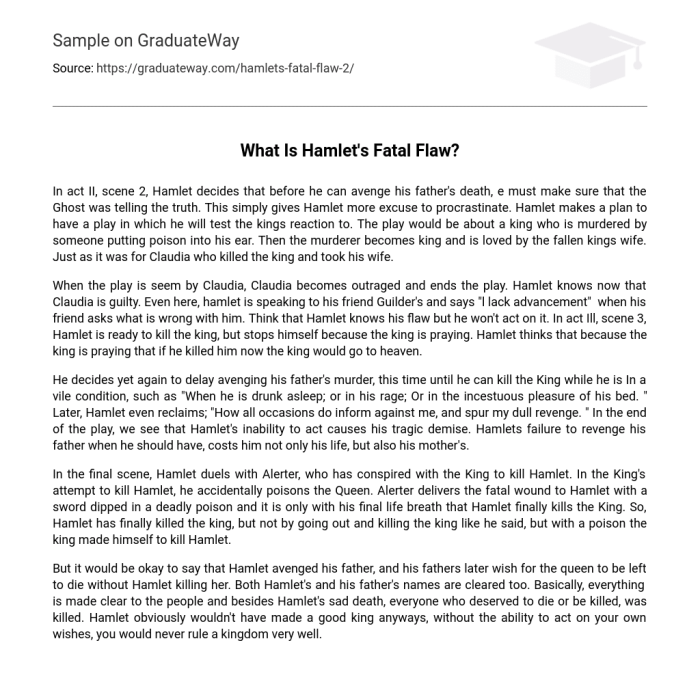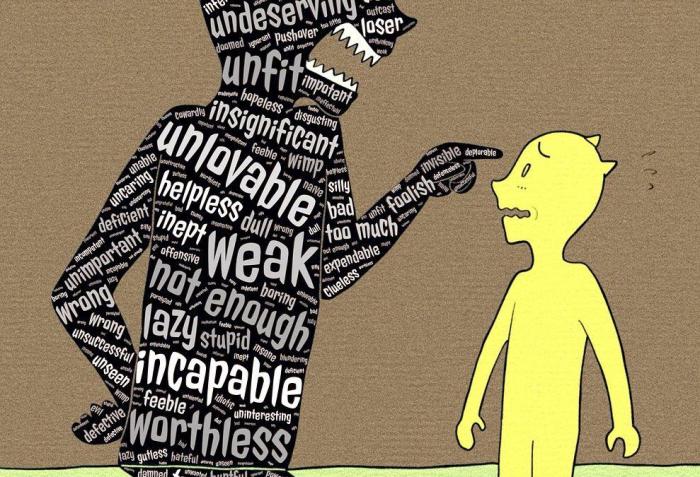What is Macbeth’s fatal flaw? This question has fascinated readers and audiences for centuries, as the Scottish play delves into the depths of human ambition, guilt, and the destructive power of evil. Macbeth’s tragic journey is a complex and nuanced exploration of the human psyche, revealing the devastating consequences that can arise when ambition blinds us to reason and morality.
Throughout the play, we witness Macbeth’s transformation from a noble warrior to a ruthless tyrant, driven by an insatiable thirst for power. His fatal flaw, a combination of unchecked ambition and a willingness to embrace darkness, ultimately leads to his downfall.
Ambition

Ambition, a driving force for many, played a pivotal role in Macbeth’s downfall. His unbridled desire for power and status ultimately led to his tragic demise.
Consequences of Macbeth’s Excessive Ambition
Macbeth’s ambition had dire consequences. It clouded his judgment, leading him down a path of violence and betrayal. His thirst for power drove him to murder Duncan, his king and guest, and later Banquo, his friend and confidant. These heinous acts severed his ties with morality and honor, leaving him isolated and guilt-ridden.
Impact on Relationships
Macbeth’s ambition also had a devastating impact on his relationships. His paranoia and suspicion alienated his wife, Lady Macbeth, who became increasingly disturbed by his actions. His ambition shattered the trust between them, ultimately leading to her downfall as well.
Blind Ambition

Blind ambition is an excessive and unwavering desire for power or success, often without regard for the consequences or ethical implications. It is a driving force that can lead to reckless and destructive behavior.
Examples of Macbeth’s Blind Ambition
- Macbeth’s initial ambition is fueled by the witches’ prophecies, which he interprets as a sign of his destiny to become king.
- His ambition leads him to murder King Duncan, the rightful heir to the throne.
- Macbeth’s paranoia and fear of losing his power drive him to commit further murders, including the deaths of Banquo and Macduff’s family.
Consequences of Macbeth’s Blind Ambition
- Macbeth’s blind ambition ultimately leads to his downfall. He alienates his friends and supporters, and becomes isolated and alone.
- His guilt and paranoia consume him, leading to his mental and emotional decline.
- Macbeth’s ambition ultimately destroys him, as he is defeated and killed by Macduff.
Guilt and Remorse

Macbeth’s guilt and remorse are inextricably linked to his mental deterioration and the unraveling of his character. The weight of his crimes torments his conscience, driving him to the brink of madness.
Macbeth’s Mental State
- Hallucinations and Delusions:Guilt manifests in Macbeth’s hallucinations, such as the appearance of Banquo’s ghost. These visions reflect his troubled mind and the guilt that haunts him.
- Sleeplessness and Nightmares:The burden of guilt robs Macbeth of peaceful sleep. Nightmares and insomnia plague him, further exacerbating his mental instability.
- Emotional Instability:Guilt erodes Macbeth’s emotional control. He becomes prone to violent outbursts, paranoia, and self-destructive behavior.
Macbeth’s Actions
- Seeking Validation:Macbeth desperately seeks validation for his actions, but his guilt makes him unable to find solace. He attempts to justify his crimes but ultimately fails.
- Alienation and Isolation:Guilt isolates Macbeth from those around him. He becomes increasingly withdrawn and suspicious, losing the support of his wife and friends.
- Self-Punishment:In a twisted form of self-punishment, Macbeth engages in reckless and self-destructive actions, further fueling his guilt and torment.
Psychological Effects
- Loss of Identity:Guilt consumes Macbeth’s identity, leaving him a shadow of his former self. He struggles to reconcile his past actions with the person he has become.
- Moral Collapse:The weight of guilt leads Macbeth to a complete moral collapse. He abandons all ethical principles and becomes a ruthless tyrant.
- Descent into Madness:Ultimately, guilt and remorse drive Macbeth to the brink of madness. His hallucinations, delusions, and self-destructive behavior culminate in his downfall.
Superstition and Belief in Prophecy

Superstition and the belief in prophecies played a pivotal role in Macbeth’s tragic downfall. Macbeth’s susceptibility to superstition made him vulnerable to manipulation by the witches and ultimately led to his demise.
The Witches’ Prophecies
The witches’ prophecies acted as a catalyst for Macbeth’s ambition. Their prediction that he would become Thane of Cawdor and eventually king fueled his desire for power and set him on a path of destruction.
Macbeth’s belief in the prophecies blinded him to the consequences of his actions. He became obsessed with fulfilling the prophecies, even if it meant resorting to violence and murder.
Psychological Impact of Superstition
Superstition had a profound psychological impact on Macbeth. It instilled in him a sense of paranoia and fear, making him susceptible to manipulation by the witches and others.
Macbeth’s superstition also led him to become isolated and withdrawn. He lost trust in his friends and family and became increasingly suspicious of those around him.
Ultimately, Macbeth’s superstition and belief in prophecy became his undoing. They clouded his judgment, led him down a path of destruction, and ultimately resulted in his tragic downfall.
Masculinity and Violence: What Is Macbeth’s Fatal Flaw
Macbeth’s masculinity is inextricably linked to his violence. In the play, masculinity is associated with strength, courage, and aggression. Macbeth’s desire to prove his masculinity leads him to commit increasingly violent acts.
The Influence of Masculinity on Macbeth’s Actions
Macbeth’s masculinity influences his actions in several ways. First, it makes him more susceptible to the influence of the witches. The witches play on Macbeth’s ambition and his desire to be seen as a powerful man. They convince him that he is destined to be king, and this prophecy sets him on a path of violence.
Second, Macbeth’s masculinity makes him more likely to resort to violence to solve problems. When he is faced with a challenge, he does not hesitate to use violence to get what he wants. This is evident in his murder of Duncan, his wife’s murder of Duncan’s chamberlains, and his subsequent murders of Banquo and Macduff’s family.
The Consequences of Macbeth’s Violent Behavior
Macbeth’s violent behavior has devastating consequences. His murders lead to the deaths of many innocent people, including his wife and children. His violence also alienates him from his friends and allies, and it ultimately leads to his downfall.
Macbeth’s story is a cautionary tale about the dangers of toxic masculinity. It shows that when men are driven by a need to prove their masculinity, they can be capable of great violence. This violence can have devastating consequences for both the perpetrators and the victims.
Fate and Free Will
The interplay between fate and free will is a central theme in the tragedy of Macbeth. The witches’ prophecies set Macbeth on a path of violence and ambition, but his own choices ultimately lead to his downfall.
One of the most famous tragedies in English literature, Macbeth, is a cautionary tale about the dangers of unchecked ambition. Macbeth’s fatal flaw is his insatiable thirst for power, which leads him down a path of violence and destruction. Interestingly, there are many different religious groups in the world that have their own unique beliefs about ambition and power.
For example, the Mormons, Mennonites, and Amish all have different views on these topics. Click here to learn more about the differences between these groups and their beliefs. Returning to Macbeth, his tragic end serves as a reminder that unchecked ambition can lead to ruin.
The Role of Fate
- The witches’ prophecies create a sense of inevitability about Macbeth’s actions.
- Macbeth’s belief in the prophecies leads him to make choices that he would not otherwise have made.
- The prophecies ultimately come true, suggesting that fate is a powerful force in Macbeth’s life.
The Extent of Macbeth’s Choices
- Macbeth is not a passive victim of fate.
- He has the free will to choose how to respond to the witches’ prophecies.
- His choices ultimately contribute to his downfall.
The Tension Between Fate and Free Will
The tension between fate and free will is a central conflict in Macbeth. Macbeth’s actions are influenced by both fate and his own choices. The play explores the question of whether we are ultimately responsible for our own actions or whether our actions are predetermined by fate.
Character Transformation

Macbeth’s character undergoes a profound transformation throughout the play, driven by his insatiable ambition and the corrosive effects of guilt. Initially a valiant and honorable warrior, he gradually descends into a ruthless tyrant, haunted by his crimes.
The Witches’ Prophecies
The witches’ prophecies set Macbeth on a path of destruction. Their predictions of his future greatness sow the seeds of ambition in his mind, leading him to believe that he is destined for greatness. This belief blinds him to the moral consequences of his actions and drives him to commit heinous crimes.
The Murder of Duncan
The murder of King Duncan marks a turning point in Macbeth’s character. After the deed is done, guilt and remorse consume him. He hallucinates seeing the ghost of Banquo, the man he had murdered, and becomes increasingly paranoid and unstable.
The Reign of Terror, What is macbeth’s fatal flaw
As Macbeth’s guilt intensifies, he becomes a ruthless tyrant, ordering the deaths of anyone who poses a threat to his power. His paranoia and cruelty alienate his friends and supporters, isolating him from the world.
The Death of Lady Macbeth
Lady Macbeth’s death is a catalyst for Macbeth’s final descent into despair. Her death drives him to the brink of insanity, and he is left alone to face the consequences of his actions.
The Final Battle
In the final battle, Macbeth faces his mortality and realizes the futility of his ambition. He is defeated by Macduff, who avenges the murder of Duncan and brings Macbeth’s reign of terror to an end.
Frequently Asked Questions
What is Macbeth’s fatal flaw?
Macbeth’s fatal flaw is his unchecked ambition, which leads him to commit heinous crimes in his pursuit of power.
How does Macbeth’s ambition manifest itself?
Macbeth’s ambition manifests itself in his desire to become king, even if it means killing his own king and friend, Duncan.
What are the consequences of Macbeth’s fatal flaw?
The consequences of Macbeth’s fatal flaw are devastating. He loses his sanity, alienates his friends and family, and ultimately meets a tragic end.